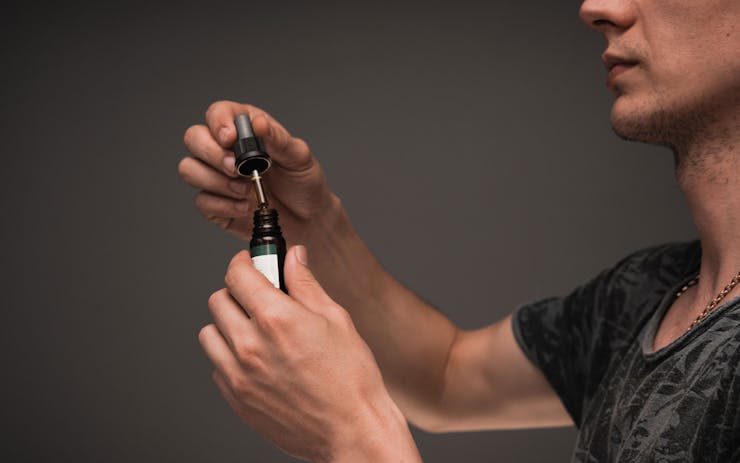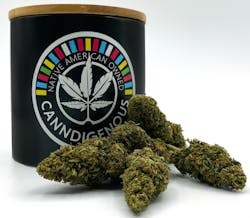Is CBD legal? Probably—but maybe not. It all depends on where you are.
CBD has been federally legal since late 2018—if it’s derived from hemp. But that doesn’t necessarily mean it’s legal in your state. We’ve compiled a state-by-state table of CBD laws, below, that will help you gain clarity.
Note: The chart below applies to unlicensed CBD products only. State-licensed CBD products sold in adult-use and medical cannabis stores operate under different rules.
CBD Legal Status, State-by-State
| State | Is CBD legal? | Restrictions |
|---|---|---|
| Alabama | Yes | None |
| Alaska | Yes | No CBD-infused food/beverage allowed |
| Arizona | Yes | No food/beverage |
| Arkansas | Yes | No food/beverage |
| California | Yes | No food/beverage |
| Colorado | Yes | No baked goods |
| Connecticut | Yes | Food/bev must be registered |
| Delaware | Yes | Hemp grower must be affiliated with Delaware State University |
| Florida | Yes | Labeling is regulated |
| Georgia | Yes | No food/beverage |
| Hawaii | Yes | None |
| Idaho | No | Illegal in every form |
| Illinois | Yes | None |
| Indiana | Yes | Labeling is regulated |
| Iowa | No | Illegal in every form |
| Kansas | Yes | No food/beverage |
| Kentucky | Yes | CBD tea not allowed |
| Louisiana | Yes | Many product restrictions |
| Maine | Yes | OK only if CBD extracted from licensed Maine hemp grower |
| Maryland | Yes | Unclear |
| Massachusetts | Yes | CBD food/bev requires purity testing |
| Michigan | Yes | No food/beverage |
| Minnesota | Yes | No food/beverage |
| Mississippi | Yes | Must be at least 20:1 CBD:THC ratio |
| Missouri | Yes | Age 18+ only. Sales require state registration. |
| Montana | Yes | No food/beverage |
| Nebraska | Yes | No food/beverage |
| Nevada | Yes | No food/bev; CBD sales allowed in cannabis stores only |
| New Hampshire | Yes | Regulations coming |
| New Jersey | Yes | None |
| New Mexico | Yes | None |
| New York | Yes | No food/bev; purity testing required |
| North Carolina | Yes | No food/beverage |
| North Dakota | Yes | None |
| Ohio | Yes | None |
| Oklahoma | Yes | None |
| Oregon | Yes | Label regulations coming |
| Pennsylvania | Yes | No food/bev; label regulations coming |
| Rhode Island | Yes | Label guidelines coming |
| South Carolina | Yes | No food/beverage |
| South Dakota | No | Not legal in any form |
| Tennessee | Yes | None |
| Texas | Yes | Label guidelines coming |
| Utah | Yes | Registration required for sales |
| Vermont | Yes | Can't combine CBD with meat or dairy. Maple syrup has its own rules. |
| Virginia | Yes | None |
| Washington | Yes | No food/beverage |
| West Virginia | Yes | No food/beverage |
| Wisconsin | Yes | No food/beverage |
| Wyoming | Yes | None |
The basics on CBD
CBD (cannabidiol) is a compound derived from the cannabis plant. Cannabis has been federally illegal since 1937. As long as cannabis has been illegal, so has CBD—even though it has no intoxicating qualities.
That changed late last year.
Now that hemp is no longer a controlled substance, and CBD comes from hemp, all CBD must be legal, right? Not so fast.
In December 2018, President Trump signed the Agricultural Improvement Act of 2018 (aka the 2018 farm bill) into law. That Act included a section removing hemp from the Controlled Substances Act. Hemp and marijuana are both cannabis. The only difference is the federal government considers cannabis with less than 0.3% THC, the intoxicating cannabinoid, to be legally classified as “hemp.”
Now that hemp is no longer a controlled substance, and CBD can be extracted from hemp, all CBD must be legal, right? Not so fast.
Passage of the farm bill “legitimized hemp as an agricultural crop as opposed to a drug/controlled substance,” writes Bob Hoban, one of the nation’s most experienced hemp attorneys. “However, while this legislation paved the way for the hemp industry’s expansion it in no way made the path to legal compliance any clearer for those in the hemp industry.” And by extension: It’s no clearer for those in the CBD industry, either.
Shop highly rated dispensaries near you
Showing you dispensaries nearAs with all things having to do with cannabis, it helps to know which laws are in play: Federal, state, and those we’ll call “mixed jurisdictional”—the rules and regs enforced by health departments and the like.
Federal law
Federal law is now clear, thanks to the farm bill. Federal authorities are no longer in the business of arresting people for growing hemp, extracting CBD, or possessing either. The DEA is out of the CBD game.
More specifically, the farm bill removed hemp and hemp derivatives from the definition of “marijuana” in the Controlled Substances Act. The new law also specifically tasked the US Food and Drug Administration (FDA) with regulating hemp-derived food and drug products. (More on that below.)
State laws
Here’s where it gets complicated.
Federal legality doesn’t automatically confer state legality. Each state handles hemp and CBD differently. In Idaho, Iowa, and South Dakota, CBD is entirely illegal. In New Jersey, New Mexico, and North Dakota it’s legal without restriction. In Alaska, California, Washington, and many other states it’s legal but can’t be sold in combination with food or beverages—except in licensed cannabis stores.
In Vermont it’s legal, although when CBD is added to maple syrup it’s illegal to label the product “Pure Maple Syrup.” Ahh, Vermont.
FDA rules are coming
FDA officials are actively working to create federal regulations around CBD. After holding a highly publicized hearing earlier this year, their staffers have gone away to start crafting the regs. A first draft is expected in early 2020.
Those officials are in a bit of a bind. CBD has already been approved as a pharmaceutical drug in the form of Epidiolex, a drug created by GW Pharma to inhibit seizures. Epidiolex went through the FDA’s grueling drug approval process, and it took years.
After holding a highly publicized hearing earlier this year, FDA officials have gone away to craft the regulations. A first draft is expected in early 2020.
Once a compound has been approved as a drug, the FDA typically does not allow it to be sold in over-the-counter mainstream markets. But it’s currently being used most often as a dietary supplement, like vitamins.
If the FDA bans all non-prescription forms of CBD, it risks opening up a massive illegal market—which would result in a criminal trade in unlicensed, untested, and unregulated CBD. We’ve just experienced the real dangers of that with the illicit trade in THC vape cartridges, which led to the national outbreak of VAPI lung, also known as EVALI.
As we wait for the FDA to release its proposed CBD rules, agency officials are reminding everyone that many of the CBD food and beverage products currently on the market are not technically legal. On June 16, the FDA released a document that said: “We are aware that there may be some products on the market that add CBD to a food or label CBD as a dietary supplement. Under federal law, it is currently illegal to market CBD this way.” At the same time, no federal agents are enforcing that particular law.
County health agencies matter, too
Even within states that allow the legal sale of hemp-derived CBD, there may be complications at the local level.
Some local health departments, for example, may choose to prohibit the sale of CBD in food and beverage products in commercial establishments.
A few years ago some restaurants near Seattle area began offering CBD-infused cocktails to their patrons. That ended when local county health officials stepped in and reminded restauranteurs that CBD was not a known and approved food or beverage. (“They’re erring on the side of caution,” one restaurant owner told me at the time. “They say they don’t quite know what CBD is yet, so they want everyone to hold off until they figure it out.”)
What you need to know
As of late 2019, the general rule for consumers is this: CBD is legal to possess and consume everywhere except Idaho, Iowa, and South Dakota. The rule for manufacturers and retailers is this: Check your local jurisdiction and vet your business plan with a lawyer who knows local CBD laws.
In 2019, Leafly editors tried to purchase more than 75 products to test their CBD content as part of our Leafly CBD Test series. To our surprise, it turned out to be more difficult than we anticipated.
National drug stores like CVS and Walgreens carry CBD products in some states but not in others. When we tried to order CBD products online, some companies agreed to deliver to the Leafly office in Washington state, while others refused. We know the cause was location, because everything was well and fine with our order right up until the point we entered our ZIP Code.





